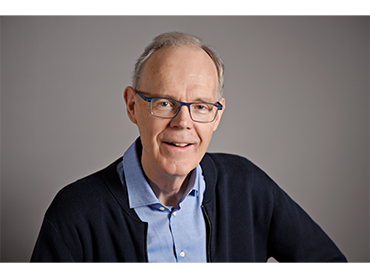Professor Bob Morris is one of two U of T faculty recently recognized by the American Chemical Society in its 2025 awards announcement, with a win of the award for Organometallic Chemistry.
The award celebrates a recent advancement with major impacts on research in organometallic chemistry. In its announcement, ACS said Morris, “has significantly advanced our understanding of transition metal hydride and dihydrogen complexes and the role they play in catalytic organometallic reactions.”

What does that mean? The work referred to, according to Morris, uncovers fundamental ways that a bond between a metal ion and hydrogens (such as a metal hydride, dihydride or dihydrogen complex) in solution can react.
“A metal ion is a metal that has lost a few electrons so that it is positively charged, such as the ferrous ion,” Morris explained. “New simple equations that predict reactivity were discovered for metals across the periodic table. Most recently, they have been applied to metal hydrides with unpaired electrons that are important in the electrochemical generation and use of hydrogen gas.”
Hydrogenation, a very important reaction in industry, is often catalyzed by expensive and toxic metal ions from “platinum group metals,” a group including ruthenium, rhodium and iridium.
By contrast, the principles applied by Morris and his research group were applied in the discovery of some of the first solution-based hydrogenation catalysts based on iron.
“This was an advance because the hydrogenation of organic compounds by our catalysts, based on ferrous ions, takes place under mild conditions of temperature and pressure, adding hydrogen in some cases to make the building blocks of pharmaceuticals with high precision.”
Asked about memorable breakthroughs in the research process, Morris said: “It was a common belief that adding carbon monoxide (CO) to a metal ion would poison its activity as a hydrogenation catalyst, at least for the platinum group metals. While trying to get ferrous ions to work, I suggested to Dr Christine Sui-Seng in 2008 that we try adding CO to our inactive compounds.”
"In my Bioinorganic Chemistry course (CHM437) I had been teaching that certain bacteria use CO on iron to catalyze reactions with hydrogen. It was a real surprise when we discovered that our iron catalysts became very active for adding hydrogen to organic compounds when we activated the ferrous ion with just one carbon monoxide molecule!”
Morris says he has been overwhelmed by the support of his many colleagues, in the field and around the university, who have congratulated him on this achievement. “It is very generous of the American Chemical Society to share its National Awards with international scientists. I also have to thank the fantastic students, both graduate and undergraduate, and postdoctoral fellows who have done research in my lab over 44 years and NSERC for funding this fundamental research.”
“With a relatively small research group focusing on specific types of chemical reactions, we have really contributed to an understanding of the fundamental chemistry of transition metal hydride complexes. I am very grateful to be teaching and researching in a stellar Chemistry Department at the University of Toronto with outstanding colleagues, staff and facilities.”
Morris says there is still much to discover in the field of catalysis and transition metal chemistry. "There is the promise of something new every day, and it is wonderful to see students making these discoveries. They are 20-30 years old and so that is the age I feel also.”
The ACS Award recipients will be honored at an award ceremony on March 25, 2025, in conjunction with the ACS Spring 2025 meeting in San Diego.
Asked to offer advice to new chemists and graduate students, Morris concluded: "Work hard at things in the areas where you have special strengths – whether they be making, measuring, calculating, writing or dreaming. If you love what you are doing, great things will happen.”
Work hard at things in the areas where you have special strengths – whether they be making, measuring, calculating, writing or dreaming. If you love what you are doing, great things will happen.
Prof. Bob Morris


